|
The shape of a fried egg depends on the thickness of its white and on the temperature at which it is cooked. The ideal temperature to prepare fried egg is around 126-137  . .
-
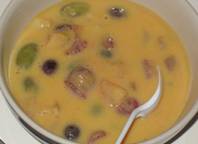 Custards Custards
In custards egg acts as thickening agent. True custard consists only of eggs, milk, sugar and flavouring custards are of two types, the stirred or soft custard.
The foaming of egg white plays an important role in many foods because it makes the products light in texture and contributes leavening. Egg white foam is a colloid consisting of bubble of air surrounded by albumin that has undergone some denaturation on the liquid air surfaces.
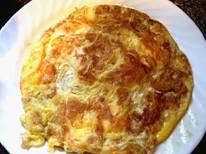
Omelettes may be plain or foamy. The plain omelette is made without separating the yolk from white. The whole egg is beaten together with flavouring materials. The foamy omelette is prepared by beating the whites and yolks separately. For making an omelette, the heat should be kept low so that the mass cooks slowly and can be heated uniformly through out without toughening the bottom layers.
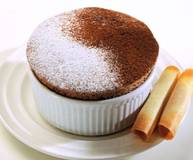
They are similar to foamy omelette, except that have a thick white sauce base and contain additional ingredients such as grated cheese, vegetable pulp or ground meats. Dessert souffles are sweet and may contain lemon, strawberry and chocolate. Souffles are usually baked though they can be steamed. Crepes are thin, tender pan cakes containing a relatively high proportion of egg. They can be filled with a variety of items, including fish, meat, poultry, cheese, vegetables or fruits. Crepes can be served with sweet, dessert type fillings.
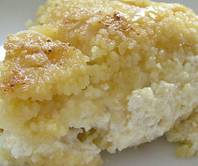
They are cooked and served in the same dish. The dish is coated with butter or margarine, the eggs are broken into it and the dish is set directly on the range until the whites are coagulated. The dish is then transferred to a moderate oven a finish cooking. Care must be taken not to over cook and toughen shirred eggs.
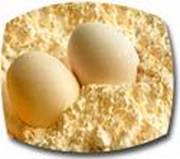 Drying is another method of egg preservation and there is a demand for egg power for the preparation of commercial egg products. The white, yolk or whole egg, after pasteurization, may be dried by any of the several methods of drying. The most common method employed for drying eggs is spray drying. The liquid egg is forced through an atomizer as a fine spray into a drying chamber through which hot air is blown. The powdered egg is cooled, collected and packaged. Egg-white contains traces of glucose. When the dehydrated white or whole egg is stored at temperatures much above freezing, the glucose combines with egg proteins resulting in browning. To prevent this, glucose is to be removed with glucose oxidase or by fermentation with yeast prior to drying. Drying is another method of egg preservation and there is a demand for egg power for the preparation of commercial egg products. The white, yolk or whole egg, after pasteurization, may be dried by any of the several methods of drying. The most common method employed for drying eggs is spray drying. The liquid egg is forced through an atomizer as a fine spray into a drying chamber through which hot air is blown. The powdered egg is cooled, collected and packaged. Egg-white contains traces of glucose. When the dehydrated white or whole egg is stored at temperatures much above freezing, the glucose combines with egg proteins resulting in browning. To prevent this, glucose is to be removed with glucose oxidase or by fermentation with yeast prior to drying.
Dried eggs keep best when the moisture content is low and if they are kept in tightly sealed containers. Dried egg-white is quite stable during storage. A lower temperature retards the undesirable changes, until at -18  when very little change occurs. Dried eggs may be reconstituted before use by mixing with an appropriate quantity of water. The nutritive value of frozen eggs and dried eggs will practically be the same as shell eggs, if properly stored. when very little change occurs. Dried eggs may be reconstituted before use by mixing with an appropriate quantity of water. The nutritive value of frozen eggs and dried eggs will practically be the same as shell eggs, if properly stored.
Role of egg in cookery
There are few ingredients in food preparations that are useful in so many different ways as are eggs. Used alone or in combination with other foods, they may become the major protein dish for a meal.
EGG PICKLE PREPARATION **
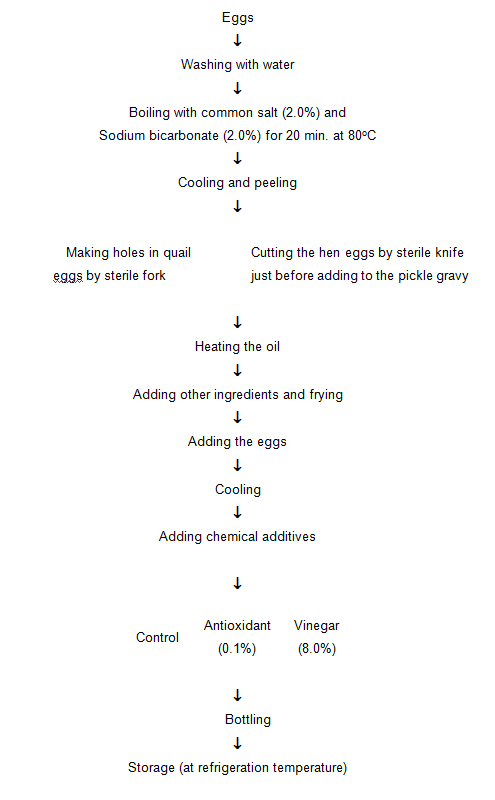
Egg pickle **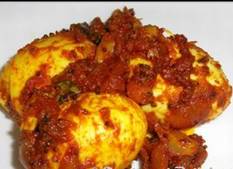
Ingredients |
Quantity |
Hen egg |
Quail egg |
Eggs |
2 Nos. |
6 Nos. |
Chilli powder |
7 g |
7 g |
Ginger |
2 g |
2 g |
Garlic |
2 g |
2 g |
Pepper |
2 g |
2 g |
Mustard powder |
1 g |
1 g |
Cinnamon |
1 g |
1 g |
Salt |
5 g |
5 g |
Oil |
15 g |
15 g |
Method
-
Eggs were washed well with water and boiled with 2.0 per cent common salt and 2.0 per cent sodium bicarbonate for 20 min at 80  for ease of peeling.
-
After boiling and peeling, holes were made on the quail egg by sterile fork /cut the hen eggs by sterile knife just before adding to the gravy.
-
Oil was heated and all the powdered spices were added and fried till it becomes golden brown.
-
The hard boiled eggs were added to the gravy.
-
Preservatives were added and bottled.
|
Egg pudding **
Ingredients |
Quantity |
Hen egg |
Quail egg |
Egg |
2 Nos. |
8 Nos. |
Milk |
2 cups |
2 cups |
Sugar |
10 tsp |
10 tsp |
Vanilla essence |
Few drops |
Few drops |
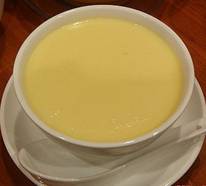
Method
-
Milk was boiled with sugar and cooled.
-
Eggs were beaten with essence to get a foam.
-
Beaten egg was mixed with cold milk.
-
Mixture was poured into the pudding moulds.
-
Then the product was steamed for 30 min in the pressure cooker followed by cooling.
-
The cooled product was kept at refrigeration temperature.
|
Egg custard**
Ingredients |
Quantity |
Hen egg |
Quail egg |
Egg |
2 Nos |
8 Nos. |
Milk |
2 cups |
2 cups |
Sugar |
10 g |
10 g |
Salt |
To Taste |
To taste |
Vanilla essence |
Few drops |
Few drops |
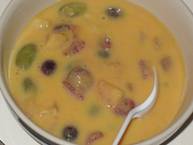
Method
-
Milk was boiled over a pan of boiling water.
-
Eggs were beaten thoroughly with the essence.
-
Salt and sugar was added to the beaten egg.
-
Egg mixture was added to milk and stirred till it gets thickened.
-
The mixture was poured into custard cups and kept at refrigeration temperature.
|
Egg chops**
Ingredients
|
Quantity |
Hen egg |
Quail egg |
Egg |
3 Nos. |
12 Nos. |
Big onion |
2 Nos. |
2 Nos. |
Green chillies |
2 Nos. |
2 Nos. |
Tomatoes |
3 Nos. |
3 Nos. |
Chilli powder |
½ tsp. |
½ tsp. |
Groundnut oil |
50 ml |
50 ml |
Mustard |
For seasoning |
For seasoning |
Salt |
For taste |
For taste |
Method
-
Eggs were boiled and cut into small pieces.
-
Tomatoes, chillies and onions were chopped.
-
Oil was heated over a pan and seasoning was done.
-
Chopped onion, chillies, tomatoes, salt and chilli powder was added.
-
After 2 minutes of cooking, eggs were added and cooking were continued for another 2 minutes to complete the cooking process.
|
Egg Bonda **
Ingredients |
Quantity |
Hen egg |
Quail egg |
Egg |
3 Nos. |
12 Nos. |
Bengal gram flour |
100g |
100 g |
Chilli powder |
1 tsp |
1 tsp |
Salt |
To taste |
To taste |
Oil |
For frying |
For frying |
Method
-
Bengal gram flour was sieved and salt and chilli powder in required amounts were added.
-
Water in required amounts was added to get a paste.
-
Eggs were boiled and peeled.
-
Peeled eggs were dipped in the bengal gram flour and deep fat fried in the frying pan.
|
Egg cutlet **
Ingredients |
Quantity |
Hen egg |
Quail egg |
Eggs |
3 Nos. |
12 Nos. |
Boiled potatoes (small) |
2 Nos. |
2 Nos. |
Coriander leaves |
5 g |
5 g |
Small minced onion |
1No |
1 No. |
Mustard |
½ tsp |
½ tsp |
Salt and pepper |
To taste |
To taste |
Green chillies (chopped) |
1 No |
1 No |
Oil |
To fry |
To fry |
Method
-
Hard boiled eggs were cut into halves.
-
Potatoes were boiled, mashed and dough was prepared.
-
Seasoning was done followed by addition of minced onion, chopped chillies, coriander leaves, pepper, salt and dough.
-
Now fold a layer of potato mash as outer covering on egg halves.
-
Dipping them in beaten egg which was coated with bread crumps and roasting in hot tawa.
|
Egg sponge cake *
Ingredients |
Quantity |
Hen egg |
Quail egg |
Eggs |
3 Nos |
12 Nos. |
Sugar |
120 g |
120 g |
Butter |
60 g |
60 g |
Maida flour |
120 g |
120 g |
Baking powder |
A pinch |
A pinch |
Hot water |
As required |
As required |
Salt |
A pinch |
A pinch |
Essence |
Few drops |
Few drops |
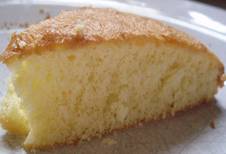
Method
-
Eggs were beaten well with essence.
-
Maida with salt and baking powder was sieved.
-
Batter was prepared using butter, sugar, maida, water, and beaten egg.
-
Batter was poured to cake mold and baked at 167-190  for 20 min.
|
Egg kulambu **
Ingredients
|
Quantity |
Hen egg |
Quail egg |
Egg |
3 Nos. |
12 Nos. |
Onion |
2 Nos. |
2 Nos. |
Tomato |
5 Nos. |
5 Nos. |
Garlic |
2 Nos. |
2 Nos. |
Ginger |
Small piece |
Small piece |
Cinnamon |
Small piece |
Small piece |
Mustard |
½ tsp |
½ tsp |
Salt |
To taste |
To taste |
Oil |
25 ml |
25 ml |
Method
-
Tomato, chilli powder and salt were mixed to a pouring consistency.
-
Oil was heated in a pan and seasoning was done.
-
Then onion was added and fried.
-
Tomato juice was added to the pan and cooked for 5 minutes.
-
Eggs were added to the kulambu and cooked for 5 more minutes to complete the cooking process.
|
TECHNOLOGIES AVAILABLE
* - Post Harvest Technology Centre, TNAU, Coimbatore.
** - Home Science College and Research Institute, TNAU, Madurai.
SOURCE
http://foodwithapinchoflove.files.wordpress.com/2008/05/6-custard-served.jpg
http://farm3.static.flickr.com/2391/1594686738_6662a19eda.jpg
www.dkimages.com/.../Chocolate-Souffle-7.html
www.salkkaaram.com/2007/12/egg-pickle.html
www.himfr.com
http://farm4.static.flickr.com/3175/2757456628_5765e87c47.jpg
http://d2.biggestmenu.com/00/00/bc/264ec1639bb99948_m.jpg
http://farm1.static.flickr.com/13/15930006_ccd3cb6986.jpg?v=0 |

 Custards
Custards


 Drying is another method of egg preservation and there is a demand for egg power for the preparation of commercial egg products. The white, yolk or whole egg, after pasteurization, may be dried by any of the several methods of drying. The most common method employed for drying eggs is spray drying. The liquid egg is forced through an atomizer as a fine spray into a drying chamber through which hot air is blown. The powdered egg is cooled, collected and packaged. Egg-white contains traces of glucose. When the dehydrated white or whole egg is stored at temperatures much above freezing, the glucose combines with egg proteins resulting in browning. To prevent this, glucose is to be removed with glucose oxidase or by fermentation with yeast prior to drying.
Drying is another method of egg preservation and there is a demand for egg power for the preparation of commercial egg products. The white, yolk or whole egg, after pasteurization, may be dried by any of the several methods of drying. The most common method employed for drying eggs is spray drying. The liquid egg is forced through an atomizer as a fine spray into a drying chamber through which hot air is blown. The powdered egg is cooled, collected and packaged. Egg-white contains traces of glucose. When the dehydrated white or whole egg is stored at temperatures much above freezing, the glucose combines with egg proteins resulting in browning. To prevent this, glucose is to be removed with glucose oxidase or by fermentation with yeast prior to drying.



